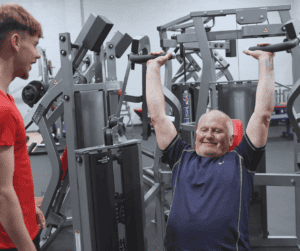According to the Mental Health Foundation, around one in eight men suffer from anxiety, stress, or depression; and out of around 6,000 suicides in the UK a year, three quarters are males.
As part of Men’s Health Month (June), we are opening the conversation about men’s mental health and making sure our male members – and staff– feel welcome, supported, and understood by us all – no matter what our gender.
So, whether you yourself have low mood or anxiety, you’re concerned about a friend’s mental health, or you simply want to know how you can support those around you, here are some things to help:
Healthy body, healthy mind
It goes without saying, exercising is a great way to keep your mind active and focussed on something else.
You don’t have to take our word for it – it’s science. Not only does movement help take your mind off things, but it also releases endorphins which make you feel good and help drown out negativity.
We know it’s easier said than done – if you’re feeling low then getting out and about is sometimes the last thing you want to do, but it will do the world of good. Breathing in some fresh air from your doorstep or a little walk around the block is a step in the right direction.
If you notice someone around you has been down and unable to get any motivation to move, perhaps you can encourage them? There’s no need to be a drill sergeant about it and insist that they join you for a 10-mile run. Just providing some gentle, regular encouragement could land on the right day and be just what’s needed.
It’s important to mention that exercise doesn’t have to be too strenuous to lift our spirits, as long as your heart starts pumping and your breathing gets heavier, the endorphins will rush to reduce the brain’s perception of pain and give you a positive result.
And this positive feeling doesn’t just go away either once you’ve stopped, it can often stay long after you’ve finished exercising. So, if you’re finding something particularly challenging, even something as simple as a 5-minuite walk could help you get away from the cycle of negative thoughts that feed depression and anxiety.
Sweet dreams
People with depression or anxiety often dread the night-time. That’s because when it’s dark and everyone else is asleep, it can feel incredibly lonely and there is no option but to focus on your thoughts. And if you’re not sleeping at night, the days also become difficult, leading to a hopeless cycle of negativity.
Some gentle exercise, whether it’s a run, an hour at the gym or half an hour of fresh air before bed, will go a long way towards physically tiring your body out; which in turn will reduce the amount of spare energy you have for your brain to overthink.
If you haven’t tried it already, maybe some gentle exercise before bed could be a step in the right direction to help get you out of a negative cycle.
If you know someone who has been experiencing low mood, perhaps ask them to join you for a late-night walk or an evening game of football. It could be the invite they have been waiting for.
Share the load
As the saying goes, a problem shared is a problem halved. But what if you feel like you don’t have anyone to talk to? Perhaps you feel like those around you don’t have time, or will judge you for not being able to deal with it yourself.
Either way, there is no shame in asking for help, and there are plenty of people in your community who will be only too happy to step up.
If you don’t feel like you can speak to those around you, places like Life Leisure can be a goldmine of thoughtful and listening ears. Whether it’s someone on reception, a personal trainer, or an off-duty swimming instructor – we’re all happy to have a chat. We can also provide signposting into the Family Hubs network for those with children under 19 years old. Seek Family Hubs support from our Avondale, Brinnington, Grand Central, Houldsworth Village, Romiley and Stockport Sports Village hubs.
If approaching someone feels a little too scary, then joining a group exercise class or taking part in a team sport could also provide you with quick access to a support network. Not only will you have people to have fun with and release those endorphins, but there will also be a ready-made group of friends you can approach outside of the game. A team doesn’t disband once off the pitch, real teammates are there to support you whenever you need it.
It might be that you’re a team player who would like to help more. All it takes is making yourself more available. Perhaps you can hang around for a little longer after a match or group exercise class, or invite the quieter members of your group for a drink away from the gang occasionally to check-in.
Start small
If attending a group exercise class or hitting the gym is way out of your comfort zone, take a step back and start small.
Text a friend and see if they fancy going for walk. Or take yourself off for a walk and open your eyes and mind to the world around you. Even smiling at someone in the street is enough to release some endorphins. Working your way through these basics may lead to you asking a friend to join you at an exercise class or event, or even attending one on your own.
Being depressed, anxious or stressed isn’t unusual. As we said earlier, it’s pretty common.
If such feelings start having a prolonged impact on your life, it’s always worth consulting a health professional and making use of the many mental health support resources now available.
But it is also worth remembering that exercise, essentially, is one of those resources – a stress management tool we can all benefit from.
This #MensHealthMonth, and every month, let’s look out for one another – and remember, you’re not alone.

























































